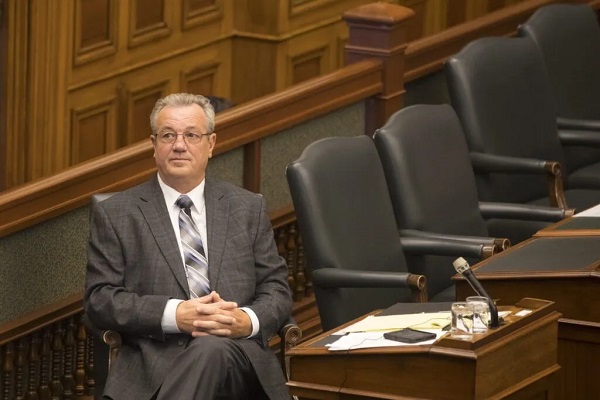National
‘This is insane’: Elon Musk condemns Trudeau gov’t ‘Online Harms’ bill

From LifeSiteNews
The Trudeau government’s proposed ‘Online Harms’ bill, which seeks to expand the scope of government regulation of the internet through threats of fines and lengthy prison terms, continues to be blasted by prominent international voices.
Tech mogul Elon Musk has blasted the government of Prime Minister Justin Trudeau over its recently proposed “Online Harms” legislation which could see Canadians imprisoned for years for so-called “hate speech” offenses.
On March 12, Musk posted on his own social media platform X, formerly known as Twitter, to condemn Trudeau’s newly proposed Bill C-63, the Online Harms Act, which seeks to increase the punishment Canadians could receive for “hate speech” posted online, while also expanding the length of sentences for certain already illegal “hate” crimes to life in prison.
“This is insane,” Musk wrote in response to independent outlet Not the Bee which had revealed that the new law would “allow judges to hand down life sentences for ‘speech crimes.’”
While Musk himself is not conservative, and is, in fact, a self-described “atheist” and promoter of trans-humanism, universal basic income and a carbon tax to combat so-called climate change, he does have a history of opposing the Trudeau government’s targeting of speech.
In October of last year, Musk accused Trudeau of trying to “crush free speech in Canada” over his government’s internet regulation efforts, following up on similar comments he made in 2022. Earlier this year he continued his opposition to Trudeau, referring to the left-leaning Toronto Star as “Canada’s Pravda” for its hit-piece against Trudeau’s rival, Conservative Party leader Pierre Poilievre.
Musk’s recent comment comes after Attorney General and Justice Minister Arif Virani introduced Bill C-63 last month and continues to defend the legislation despite pushback.
The new legislation seeks to create the Online Harms Act and modify existing laws, amending the Criminal Code as well as the Canadian Human Rights Act, in what the Liberals claim will target certain cases of internet content removal, notably those involving child sexual abuse and pornography.
However, the bill also seeks to punish “hate speech,” and increase punishments for existing hate propaganda offenses in a substantial manner.
Most concerning is that the new law would allow anyone to file a complaint against another person with the Canadian Human Rights Commission for “posting hate speech online” that is deemed “discriminatory” against a wide range of “protected” categories, notably gender, race and sexuality.
Penalties for violations of the proposed law include $20,000 fines and jail time, including life in prison for what it deems the most serious offenses.
According to the proposed legislation, the bill would not only punish those who have committed a “hate crime” but also those suspected of committing one in the future.
“A person may, with the Attorney General’s consent, lay an information before a provincial court judge if the person fears on reasonable grounds that another person will commit; (a)an offence under section 318 or any of subsections 319(1) to (2.1); or (b) an offence under section 320.1001,” the text of the bill reads.
However, Virani justified the legislation which would force a potential “hate crime” violators to wear an electronic tag or be banished to house arrest, arguing the measure is “very important” in preventing anyone from “targeting” a variety of groups.
Virani remained vague on what would be considered “hate speech,” saying, “There’s a lot of bad stuff out there. But this is not about the bad stuff. This is a much higher level.”
He explained that some comments which are “awful but lawful” would not be punished, promising the Trudeau government would have a high threshold before punishing Canadians for their speech.
Increasingly, prominent Canadians and even Americans have begun commenting on Trudeau’s authoritarian rule over Canada, particularly his restricting of internet speech.
In late February, prominent Canadian anti-woke psychologist Jordan Peterson warned the new bill would undoubtedly lead to his criminalization.
Similarly, a top constitutional lawyer warned LifeSiteNews that the legislation will allow a yet-to-be-formed digital safety commission to conduct “secret commission hearings” against those found to have violated the law, raising “serious concerns for the freedom of expression” of Canadians online.
Additionally, Campaign Life Coalition recently warned that Bill C-63 will stifle free speech and crush pro-life activism.
Justice
Canadian government sued for forcing women to share spaces with ‘transgender’ male prisoners

The Edmonton Institution for Women, one of six women’s corrections facilities in Canada (Photo credit: The Canadian Press/Jason Franson)
The Justice Centre for Constitutional Freedoms announces that a lawsuit has been launched against the Federal Government, seeking an end to the practice of forcibly confining female inmates of federal prisons with trans-identifying male inmates. The lawsuit claims that this practice is cruel and unusual punishment and violates the Charter rights of female inmates, including “their right to be protected from mental, physical, and sexual abuse…”
The lawsuit was filed on behalf of the national and non-partisan organization Canadian Women’s Sex-Based Rights (CAWSBAR) with the Federal Court of Canada in Toronto on April 7, 2025.
Since 2019, CAWSBAR has advocated for a Canada “where women and girls can be assured that their sex-based rights to bodily privacy ,dignity, fairness, and security are upheld both in law and in public policy.”
Their lawsuit takes aim at the Correctional Service Canada’s Commissioner’s Directive 100: Gender Diverse Offenders, which permits the practice of transferring trans-identifying male inmates to any of six women’s prisons across Canada. CAWSBAR is asking the Federal Court to declare that this Directive is of no force or effect.
Their lawsuit references an extensive list of physical and psychological harms female inmates have suffered as a result of being forcibly confined with trans-identifying male prisoners, including sexual assaults, sexual harassment, beatings, stalking, and grooming.
Many female prisoners come from disadvantaged backgrounds that often include past physical and sexual abuse from males. The current practice of having both males and females attend the same group therapy sessions makes it difficult for female inmates to fully participate in the treatment they seek. In advancing CASWBAR’s claim, lawyers will provide the court with evidence of psychological and physical harms that often lead to Post Traumatic Stress Disorder, flashbacks of stressful violent and/or emotionally disturbing events involving men, anxiety, anger, depression, hopelessness, and suicidality.
Female inmates are reluctant to complain about these arrangements. The court document states that complaints “are often viewed by correctional officers and staff as harassment, intolerance, and/or ‘transphobia.’ Female inmates do not speak out for fear of an entry on their institutional record, which will eventually be considered by the Parole Board of Canada, and which could impact the decision to grant or not grant parole.”
CAWSBAR is not the first organization to report on the risks associated with forcibly confining female inmates alongside trans-identifying males. According to 2023 research from the Macdonald-Laurier Institute, “More than 90% (55 of 61) of [trans-identified male] prisoners were incarcerated for violent offences. Of the group, nearly half (25) had a most serious offence that was homicide related and a third (18) had a most serious offense that was sexual in nature. In comparison, fewer than three-in-10 (6 of 21) [trans-identified females] were convicted of homicide related offences. This proportion of [trans-identified males] incarcerated for sexual and homicide-related offences is extraordinarily high compared to the general female prison population.”
Prior to 2017, only males who had completed sex reassignment surgery could be transferred to a women’s prison.
In October 2016, however, Parliament passed Bill-16, which amended the Canadian Human Rights Act to include gender identity and gender expression as prohibited grounds of discrimination. The Corrections and Conditional Release Act was also amended to include gender identity and expression as prohibited grounds of discrimination. Bill-16 became law on June 19, 2017, and Correctional Service Canada responded by drafting policies that authorized the transfer into women’s prisons of males who identify as women but have not necessarily undergone any surgical transitions.
The current policy, Commissioner’s directive 100: Gender diverse offenders, came into effect in May 2022.
CAWSBAR’s lawsuit argues that the current practice violates the constitutionally protected rights of female inmates. Section 7 of the Canadian Charter of Rights and Freedoms guarantees female inmates the right to life, liberty, and security of the person. Section 12 guarantees the right not to be subjected to any cruel and unusual treatment. Section 15 guarantees equality before and under the law as well as the right not to be discriminated against on the basis of sex.
Their lawsuit also references section 28, which reads, “Notwithstanding anything in this Charter, the rights and freedoms referred to in it are guaranteed equally to male and female persons.”
Heather Mason is a CAWSBAR board member and former inmate at the Grand Valley Institution for Women in Kitchener, Ontario. She explained the reason for her organization’s involvement and her personal motivation. “We initiated this action,” she stated, “to highlight the federal government’s failure to protect women and to raise public awareness about the cruel and unusual punishment that incarcerated women endure as a result of this transfer policy,” she says.
“This matter is especially important to me as a former federal prisoner,” Ms. Mason continued, “I firmly believe that all women are entitled to sex-based rights and protections as specified in the Canadian Charter of Rights and Freedoms.”
John Carpay, President of the Justice Centre, stated, “This lawsuit is a pivotal stand for the safety and dignity of female inmates, challenging a policy that disregards their Charter-protected rights and exposes them to intolerable harm. It underscores the urgent need to prioritize the security of vulnerable women over ideological directives.”
COVID-19
Randy Hillier wins appeal in Charter challenge to Covid lockdowns

Former Ontario Member of Provincial Parliament Randy Hillier in the Ontario Legislature (Photo credit: The Canadian Press/Chris Young)
The Justice Centre for Constitutional Freedoms is pleased that the Ontario Court of Appeal has accepted former Ontario MPP Randy Hillier’s appeal and overturned a lower court ruling that had dismissed his Charter challenge to Ontario’s lockdown regulations. These regulations were in effect during the 2021 Covid lockdowns.
The decision was released by the Ontario Court of Appeal on Monday, April 7, 2025.
In the spring of 2021, Mr. Hillier attended peaceful protests in Kemptville and Cornwall, Ontario. He spoke about the importance of the Canadian Charter of Rights and Freedoms and the harms caused by the province’s lockdown regulations. The government’s health orders made it illegal for even two people to assemble together outdoors: a blatant and unjustified restriction of the Charter section 2(c) freedom of peaceful assembly. Other provinces allowed five or ten or more people to gather together outdoors.
Mr. Hillier has outstanding charges in Kemptville, Cornwall, Peterborough, Belleville, and Smith Falls. Prosecutors in those jurisdictions are waiting to see the results of this Charter challenge. Mr. Hillier has faced similar charges in many other jurisdictions across Ontario, but these have been stayed or withdrawn at the request of the respective prosecutors.
Mr. Hillier defended himself against the tickets that were issued to him for violating lockdown restrictions by arguing that these lockdown regulations were unjustified violations of Charter section 2(c), which protects freedom of peaceful assembly.
Four expert reports were filed to support Mr. Hillier’s case, including the report of Dr. Kevin Bardosh, which extensively reviewed the many ways in which lockdowns harmed Canadians. They showed alarming mental health deterioration during the pandemic among Canadians, including psychological distress, insomnia, depression, fatigue, suicidal ideation, self-harm, anxiety disorders and deteriorating life satisfaction, caused in no small part by prolonged lockdowns. Many peer-reviewed studies show that mental health continued to decline in 2021 compared to 2020. The expert report also provides abundant data about other lockdown harms, including drug overdoses, a rise in obesity, unemployment, and the destruction of small businesses, which were prevented from competing with big-box stores.
Justice Joseph Callaghan dismissed that challenge in a ruling issued November 22, 2023. Notably, Justice Callaghan did not reference any evidence of lockdown harms that Dr. Bardosh had provided to the court. Without reasons, the court declared that Dr. Bardosh is “not a public health expert” and then ignored the abundant evidence of lockdown harms.
Lawyers for Mr. Hillier filed a Notice of Appeal with the Ontario Court of Appeal on December 22, 2023.
Mr. Hillier’s Appeal argued that, among other things, Justice Callaghan erred in applying the Oakes test. As the Notice of Appeal states, Justice Callaghan “fail[ed] to recognize that a complete ban on Charter protected activity is subject to a more onerous test for demonstrable justification at the minimal impairment and proportionality branches of Oakes.”
The Oakes test was developed by the Supreme Court of Canada in the 1986 case R. v. Oakes, as a way to evaluate if an infringement of a Charter right can be demonstrably justified in a free and democratic society. That test has three parts. The first requires that the means be rationally connected to the objective. The second is that it should cause minimal impairment to the right. The third is proportionality, in the sense that the objective of impairing the right must be sufficiently important.
Mr. Hillier’s Appeal focused on the second part of the Oakes test: whether the regulations were minimally impairing of Mr. Hillier’s 2(c) freedom where they effectively banned all peaceful protest.
Justice Centre President John Carpay stated, “It is refreshing to see a court do its job of protecting our Charter freedoms, by holding government to a high standard. There was no science behind Ontario’s total ban on all outdoor protests.”
-

 2025 Federal Election1 day ago
2025 Federal Election1 day agoHarper Endorses Poilievre at Historic Edmonton Rally: “This Crisis Was Made in Canada”
-

 conflict1 day ago
conflict1 day agoZelensky Alleges Chinese Nationals Fighting for Russia, Calls for Global Response
-

 2025 Federal Election1 day ago
2025 Federal Election1 day agoMark Carney’s radical left-wing, globalist record proves he is Justin Trudeau 2.0
-

 2025 Federal Election1 day ago
2025 Federal Election1 day agoAn In-Depth Campaign Trail “Interview” With Pierre Poilievre
-

 Business1 day ago
Business1 day agoTrump’s tariff plan replaces free trade with balanced trade. Globalists hate that.
-

 Bruce Dowbiggin2 days ago
Bruce Dowbiggin2 days agoBettman Gives Rogers Keys To The Empire. Nothing Will Change
-

 2025 Federal Election2 days ago
2025 Federal Election2 days agoPoilievre Will Bring in ‘One and Done’ Resource Approvals, and Ten Specific Projects Including LNG Canada Phase II
-

 2025 Federal Election2 days ago
2025 Federal Election2 days agoElection Security Briefing Confirms CCP-Linked Operation Boosted Carney





